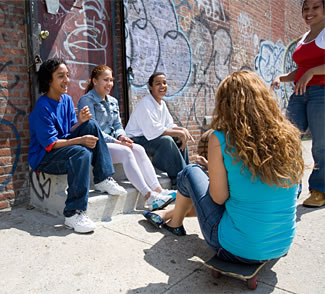| home > sexual health > condoms > the basics | |
condoms
You can get STDs from oral sex. Learn more about safer oral sex.
Use protection.
If you have sex, using condoms shows respect and responsibility.
What if the condom broke?
|
Condoms: The Basics How can you protect yourself against sexually transmitted diseases (STDs) and HIV/AIDS? There's one way that's 100% safe: don't have sex (and we're talking vaginal, anal, and oral here). If you decide to have sex, condoms are the best way to protect yourself and your partner from STDs and HIV.
Using condoms during vaginal sex is also an effective way to prevent pregnancy. Add another birth control method, and you'll have an even lower risk of getting pregnant. So double up: condoms plus another birth control method for safer sex and pregnancy prevention. What kind of condoms are there?Male condoms come in different sizes, textures, colors and flavors. They also come pre-lubricated or dry - pre-lubricated is best. Female condoms also work great. Here's what's important:
Where can I get condoms?You can get male and female condoms at many places in your community. If you are interested in getting condoms, but don't know where to start looking, talk with a school nurse, an adult you trust, or a friend. Some places that often carry condoms include:
 How much do condoms cost?In stores and pharmacies, male latex condoms usually cost between $0.50 and $1 each, and come in boxes of 3 or more. Female condoms are a bit more expensive, costing between $2 and $4 each. Places like health centers and youth organizations may have free or low-cost condoms.What if I'm allergic to latex?Some people have allergies to latex products (band-aids, rubber gloves and latex condoms). Polyurethane (a clear plastic) male condoms are an alternative to latex condoms. They cost a little bit more, but it's worth it! Female condoms are already made of polyurethane, so no worries there! |
Copyright © 2024 ACT for Youth Center for Community Action. All rights reserved.
Website by RMF Designs


